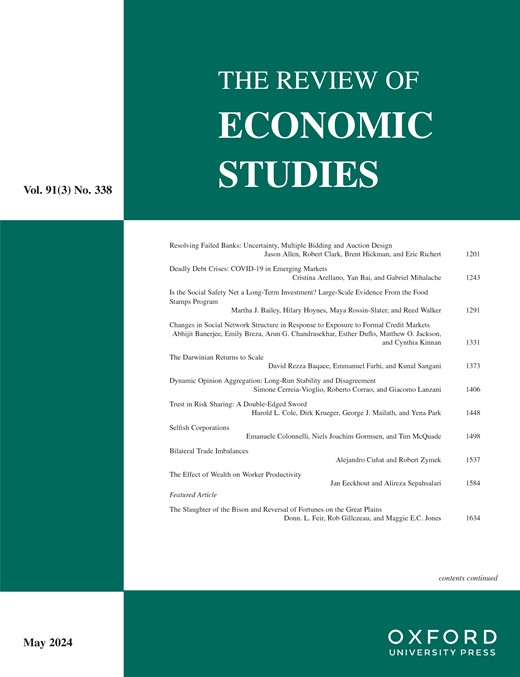评估反事实的准确性:生命周期模型中的异质生存期望
IF 6.4
1区 经济学
Q1 ECONOMICS
引用次数: 0
摘要
摘要本文表明,基于主观调查信息的个体生存期望异质性改善了退休与储蓄动态模型的样本外预测。我们考虑了三种建模生存的方法:生命表、平均主观期望和基于报告的生存概率的个人特定估计。这些模型是根据荷兰上世纪90年代的数据估算的,在那个时期,工人可以从59岁退休,而不会受到养老金福利的影响。精算调整是在21世纪初引入的,我们使用2006 - 2016年的数据来评估反事实预测的准确性。虽然这三种模型产生不同的偏好估计,但它们的样本内拟合是相似的。样本外预测确实存在显著差异。具有相同预期的模型预计,在新制度下,平均退休年龄将增加4或5年,而观察到的平均退休年龄将增加2.6年。具有异质预期的模型预测了更现实的2.7年增长。当涉及到反事实预测时,期望很重要,即使在给定的制度设置中,偏好和期望的不同组合看起来是相等的。本文章由计算机程序翻译,如有差异,请以英文原文为准。
Evaluating the Accuracy of Counterfactuals: Heterogeneous Survival Expectations in a Life Cycle Model
Abstract This article shows that individual-level heterogeneity in survival expectations derived from subjective survey information improves the out-of-sample predictions of a dynamic model of retirement and saving. We consider three approaches to modelling survival: life tables, average subjective expectations, and individual-specific estimates based on reported survival probabilities. The models are estimated using Dutch data from the 1990s, a period during which workers could retire from age 59 at no penalty to pension benefits. Actuarial adjustments were introduced in the early 2000s, and we use data from the period 2006–16 to evaluate the accuracy of the counterfactual predictions. While the three models yield different preference estimates, their within-sample fit is similar. Out-of-sample forecasts do differ markedly. The models with homogeneous expectations anticipate a 4- or 5-year increase in the average retirement age in the new regime, compared with an observed increase of 2.6 years. The model with heterogeneous expectations predicts a more realistic increase of 2.7 years. Expectations matter when it comes to counterfactual predictions, even if different combinations of preferences and expectations appear equivalent within a given institutional setting.
求助全文
通过发布文献求助,成功后即可免费获取论文全文。
去求助
来源期刊

Review of Economic Studies
ECONOMICS-
CiteScore
10.40
自引率
3.40%
发文量
75
期刊介绍:
Founded in 1933 by a group of young British and American economists, The Review of Economic Studies aims to encourage research in theoretical and applied economics, especially by young economists. Today it is widely recognised as one of the core top-five economics journals. The Review is essential reading for economists and has a reputation for publishing path-breaking papers in theoretical and applied economics. The Review is committed to continuing to publish strong papers in all areas of economics. The Editors aim to provide an efficient and high-quality review process to the Review''s authors. Where articles are sent out for full review, authors receive careful reports and feedback. Since 1989 The Review has held annual May Meetings to offer young students in economics and finance the chance to present their research to audiences in Europe.
 求助内容:
求助内容: 应助结果提醒方式:
应助结果提醒方式:


